Why does my French Bulldog lick his paws so much?

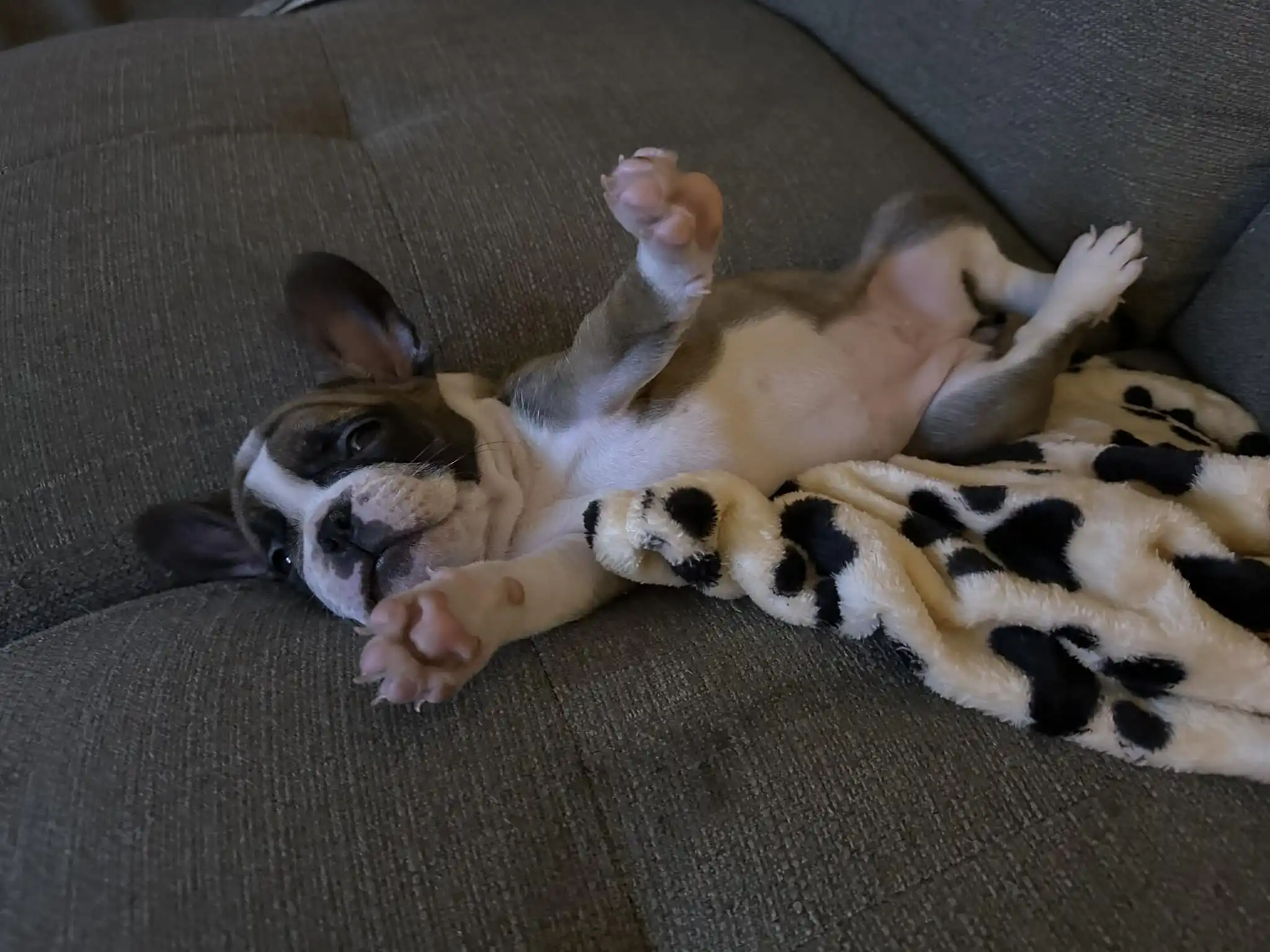
Is Excessive Paw Licking Normal Behavior in French Bulldogs?
Witnessing your French Bulldog licking its paws may raise concerns about the normalcy of this behavior.
Typically, paw licking is a natural grooming habit for all dogs, including French Bulldogs, helping them maintain paw hygiene.
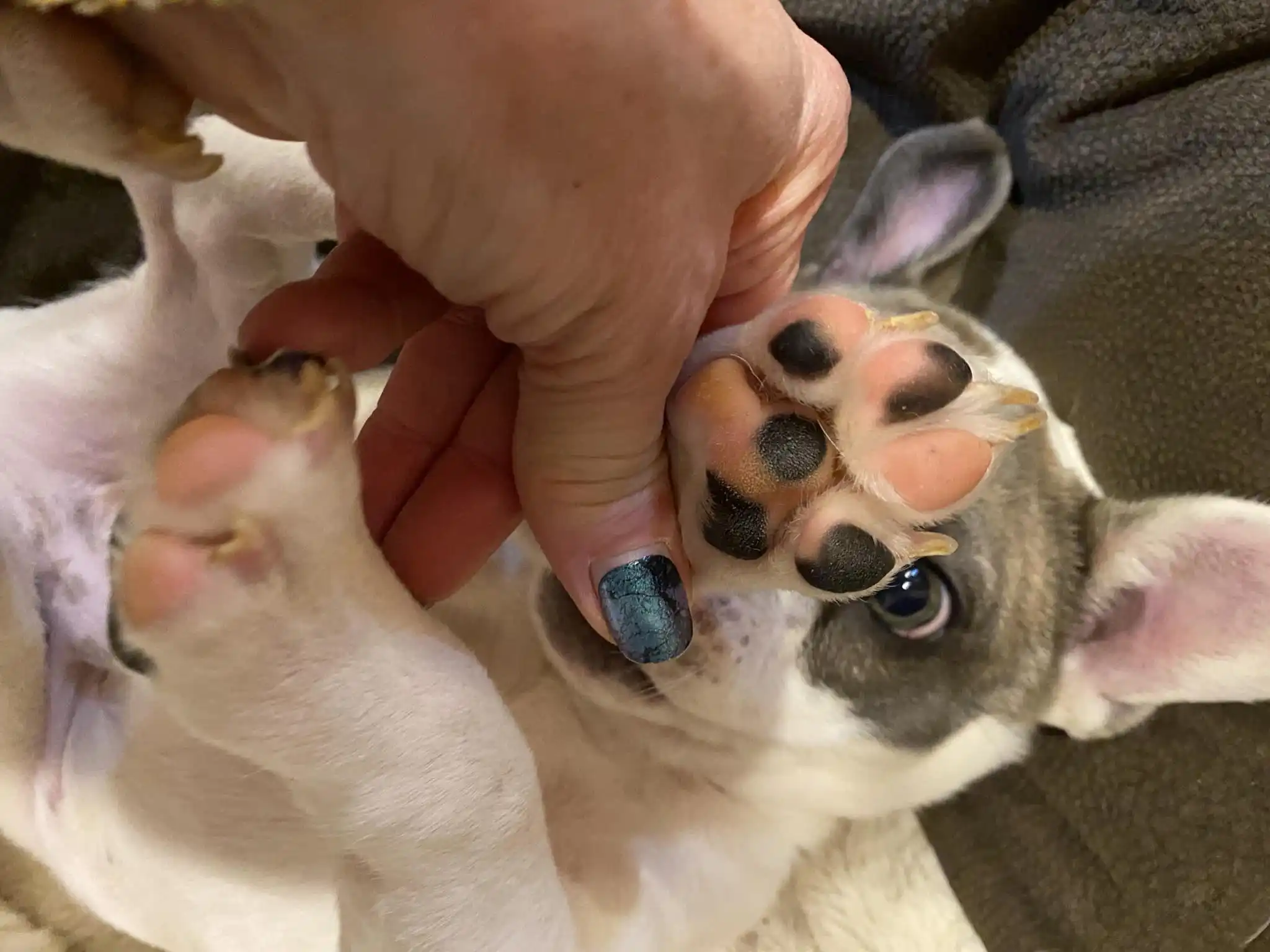
However, if the licking becomes excessive, it often indicates an underlying issue that requires attention.
This repeated licking itself can lead to irritation, emphasizing the need for prompt intervention.
Should a veterinarian confirm the paws are in good health, there’s no cause for alarm. In such cases, you can allow your Frenchie to continue its paw-cleaning routine without worry. Interestingly, they might not share the same enthusiasm for cleanliness during bath time
Understanding the Causes Behind French Bulldog Paw-Licking Behavior
Allergies:
French Bulldogs, like other dogs, can develop allergies triggered by substances like pollen or specific types of food. These allergic reactions might prompt excessive paw licking in your dog, indicating an underlying allergy issue.
Irritated Skin:
Various factors like walking on hot surfaces such as sand or asphalt, sharp and rocky terrains, or exposure to icy and cold grounds can lead to skin irritation. This discomfort may cause your French Bulldog to excessively lick its paws in an attempt to alleviate the irritation.
Infection:
Paw infections in French Bulldogs can prompt licking as a means to soothe the affected, itchy areas. This behavior might indicate an underlying infection that needs attention and treatment.
Boredom:
Some dogs, when dealing with boredom, resort to paw licking as a coping mechanism. Identifying and addressing the root cause of boredom can help curb this behavior.
Insect Bites:
Allergic reactions from insect bites can cause swelling or pain, leading your dog to lick the affected area as a way to reduce discomfort caused by the bite.
Stress or Separation Anxiety:
French Bulldogs can develop a habit of paw licking as a coping mechanism for dealing with stress or separation anxiety. Recognizing and managing these underlying issues is crucial to curb this behavior.
Pain or Discomfort:
Experiencing pain or discomfort in their paws might lead French Bulldogs to lick them in an attempt to alleviate the discomfort. Identifying the source of discomfort is vital for proper care.
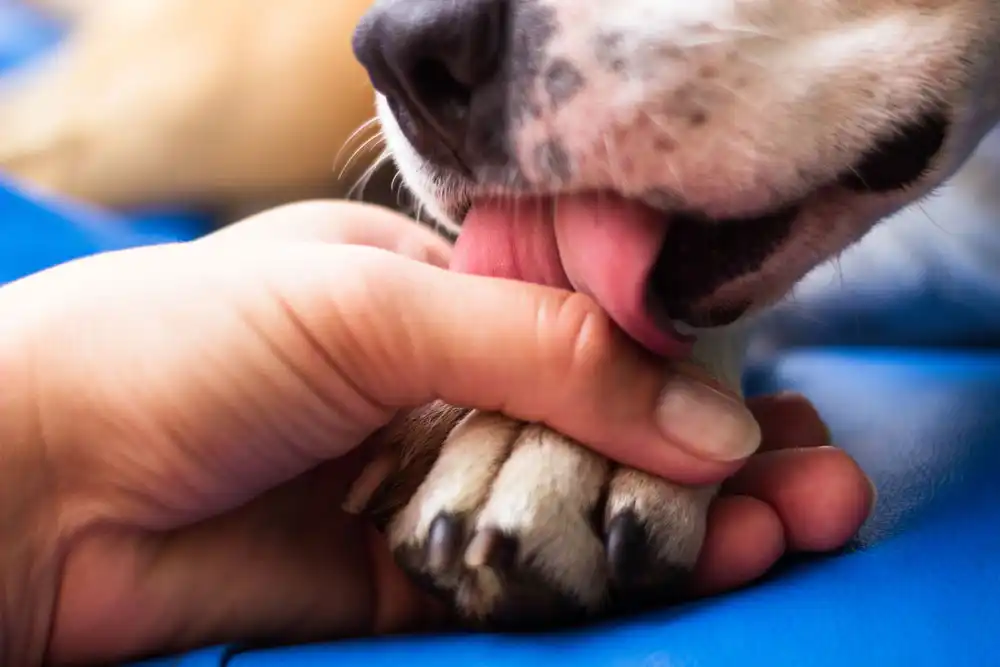
Nutritional Deficiency:
Deficiencies in certain nutrients like zinc or fatty acids can trigger excessive paw licking in dogs. Ensuring a balanced diet can help mitigate this behavior.
Habitual Behavior:
Some French Bulldogs may develop a habitual tendency to lick their paws even without any specific underlying cause. Habitual paw licking might stem from repetitive behavior and might require behavioral intervention to break the habit.
Environmental Factors:
Environmental elements like cleaning products, lawn treatments, or other substances that come into contact with your French Bulldog’s paws can sometimes cause irritation, leading to increased licking.
Each of these reasons for French Bulldog paw licking behavior may carry different levels of concern. It’s vital to observe and respond promptly. Seeking guidance from a veterinarian ensures the best care for your furry friend’s precious paws
Addressing French Bulldog Paw Licking Behavior
When it comes to curbing excessive paw licking in your Frenchie, multiple strategies can be employed. For minor cases, homemade solutions may suffice, while more severe issues necessitate professional veterinary attention.
Strategies to Reduce Paw Licking
French Bulldog owners often encounter paw licking issues and exploring multiple strategies can effectively manage this behavior.
Regular Cleaning and Moisturizing
Consistent cleaning of your Frenchie’s paws removes potential allergens and irritants, preventing itchiness. Using specialized cleaning cups or solutions aids in thorough cleaning. Moisturizing the paw pads with balms or petroleum jelly is crucial to combat dryness, a common trigger for itching.
Environmental Check and Professional Consultation
Frequently checking for foreign objects stuck in your French Bulldog’s paws, such as rocks or grass, prevents irritation. Consulting a vet is vital if persistent itching, redness, or swelling continues, as they can recommend suitable medication or treatments.
Addressing Excessive Paw Licking
Understanding the root causes and employing specific measures can effectively manage extreme paw licking behavior in your pet.
Protective Measures and Nutrition
Covering your dog’s paws with socks or washing and drying their feet after walks protects against environmental irritants. Ensuring a balanced diet with consultation from a vet helps address potential allergic triggers for paw licking.
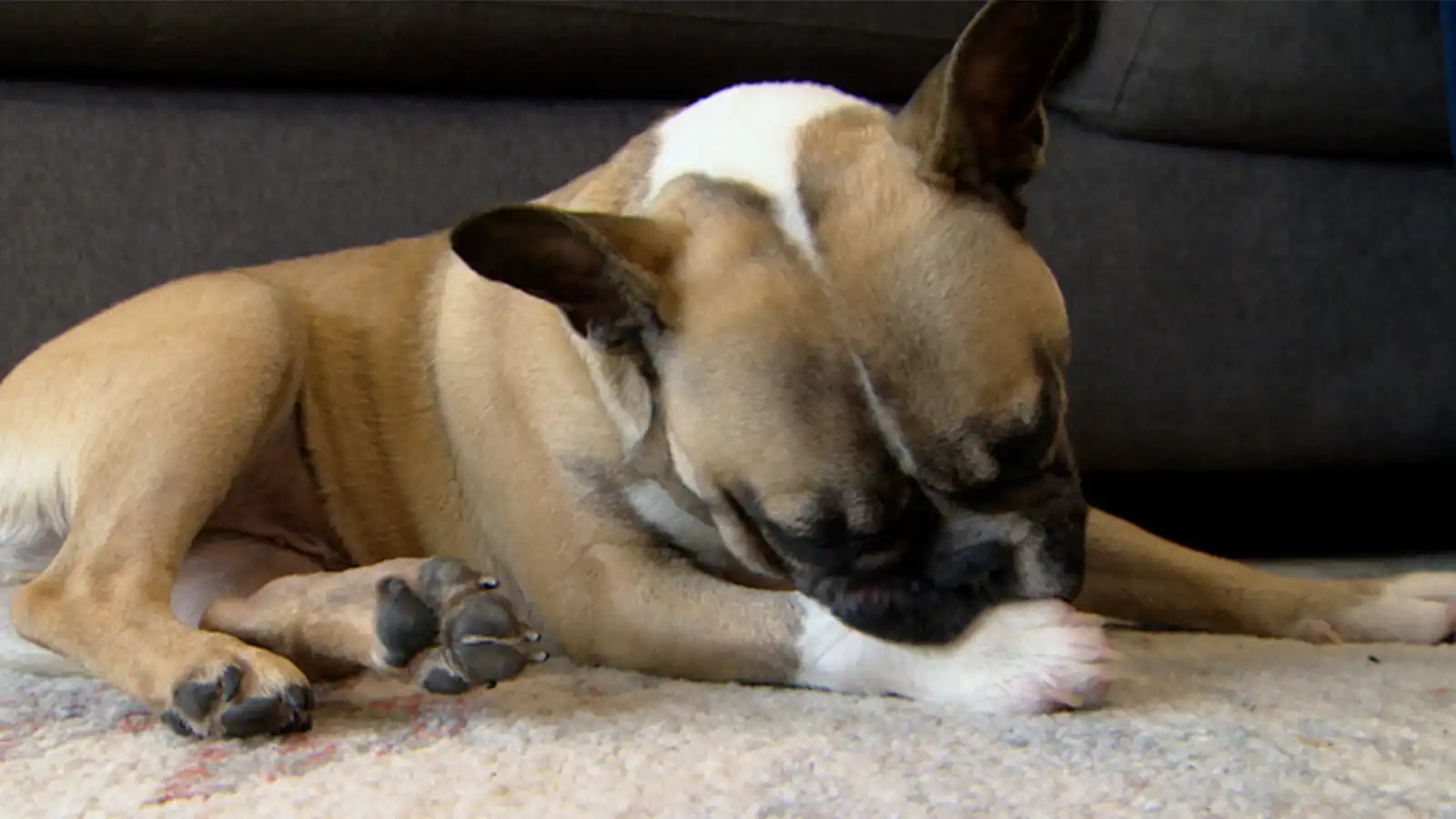
Taste Deterrents and Health Monitoring
Using bitter or citrus-based substances on your dog’s paws can deter licking if other methods fail. Vigilance against infections like bacterial yeast or fungal infections is crucial; persistent licking might lead to itchiness and redness, indicating potential health risks.
Behavioral Modification and Stress Reduction
Engaging your Frenchie in interactive activities helps alleviate boredom, reducing the urge to excessively lick their paws. Creating a stress-free environment and providing ample exercise can also curb this behavior.
Regular Paw Inspections and Grooming
Regularly inspecting your French Bulldog’s paws and trimming their nails prevents discomfort and potential irritation. Proper grooming practices, including brushing their coat, aid in overall hygiene and might indirectly reduce paw licking.
Consistency and Patience
Addressing excessive paw licking requires patience and consistent application of the chosen solutions. It might take time to notice improvements, so persistence is key to success.
In conclusion, adopting a multifaceted approach and being attentive to your French Bulldog’s needs is vital in effectively managing and curbing excessive paw licking behavior
Grooming Your Dog’s Paw: Step-by-Step Guide
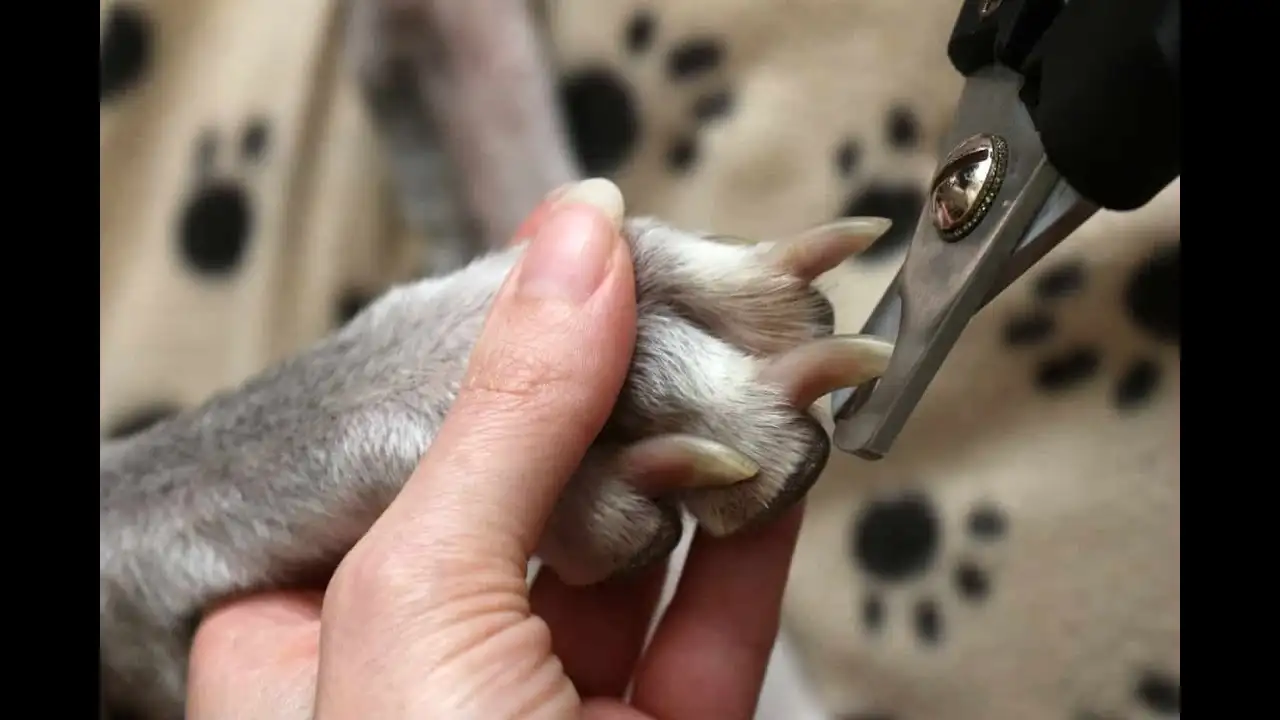
1. Inspection for Debris or Objects
- Begin by inspecting your dog’s paw pads for any debris, small objects, or bits that may cause discomfort or potential infections.
- Ensure a clear space between their paw pads to prevent irritation or pain during grooming.
2. Nail Care and Length Check
- Verify the length of your dog’s nails; they should not be excessively long to avoid discomfort while walking.
- If necessary, consider scheduling a vet appointment or confidently trim the nails at home, ensuring no harm is caused in the process.
3. Hair Trimming and Comfort Measures
- Trimming hair around the paw area might be challenging if your pet isn’t accustomed to it. Involve family members to help soothe your dog and ensure a comfortable grooming experience.
- If your dog requires additional grooming, consult your veterinarian to guarantee your pet’s overall grooming needs are met.
Grooming your dog’s paws at home ensures comfort and privacy for your pet. Remember, while grooming, prioritize your dog’s comfort and safety. If uncertain, seek professional assistance to avoid causing harm to your furry friend
what other Frenchies owners Says :
Mine gets cytopoint during bad flares. But we also try to not feed anything she’s allergic to. And she gets monthly immunotherapy shots for things in the environment. Like cat dander and certain tree pollens
Allergies or dry, itchy skin from sensitivity to walking outside. Try washing the pups paws with soap and water after every single walk, then drying it thoroughly between all the toes, then applying paw balm. Should improve within a couple of days if it’s not allergy related. (Had to do this for my pup)
Just licking can be a sign of boredom, but he is really getting in there like he is chewing…that’s usually environmental allergic reaction. Mine usually has itchy ears at the same time. I would probably speak with the vet about solutions. I know with mine if she is really digging at her paws like that they usually give her a cytopoint injection.
We have 1 that won’t stop for anything. We have tried all the special supplements, prescriptions, paw creams and pastes, everything. Nothing has worked besides putting a sock on her. We just gave up trying to stop it
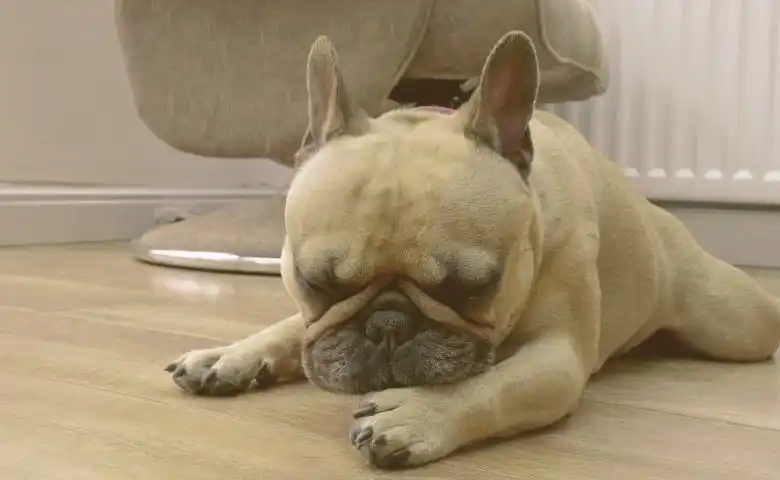
Frequently Asked Questions (FAQs) about French Bulldogs’ Paw Licking Behavior
Why do French Bulldogs lick their paws excessively?
Excessive paw licking in French Bulldogs can stem from various factors such as allergies, stress, boredom, infections, irritation, or nutritional deficiencies.
Is occasional paw licking normal for French Bulldogs?
Yes, occasional paw licking is a natural grooming behavior for French Bulldogs and most dogs. However, persistent and excessive licking might indicate an underlying issue requiring attention.
How can I determine if my French Bulldog’s paw licking is a cause for concern?
Look out for excessive licking leading to redness, swelling, irritation, or persistent discomfort. If observed, consulting a veterinarian is advisable to rule out potential health problems.
What are some home remedies to prevent excessive paw licking in French Bulldogs?
Home remedies may include regular paw cleaning, moisturizing, checking for foreign objects, providing stimulating activities, and ensuring a balanced diet. However, their effectiveness may vary based on the underlying cause.
Can stress or anxiety trigger paw licking in French Bulldogs?
Yes, stress or separation anxiety can induce paw licking in French Bulldogs. Identifying and addressing the root cause of stress helps reduce this behavior.
When should I seek professional help for my French Bulldog’s paw licking?
Seeking professional help from a veterinarian is recommended if excessive licking causes discomfort, visible signs of inflammation, or persists despite home interventions.
Are there potential health risks associated with untreated paw licking in French Bulldogs?
Untreated paw licking in French Bulldogs can potentially lead to skin infections, irritation, or more severe health issues if the underlying cause isn’t addressed promptly.
What role does diet play in controlling paw licking behavior?
Diet plays a significant role, as some allergies or nutritional deficiencies might trigger excessive paw licking. Consultation with a vet to ensure a balanced diet or identify potential allergens can help manage this behavior
Final Words
In conclusion, understanding the reasons behind French Bulldogs’ paw licking behaviors is pivotal for responsible pet ownership.
While occasional paw licking is normal, excessive or persistent licking could signal underlying issues that warrant attention.
Through proactive measures such as regular grooming, monitoring for potential irritants, maintaining a balanced diet, and seeking veterinary guidance when needed, owners can effectively manage and address this behavior.
Prioritizing a comfortable and stress-free environment for our furry companions is key to ensuring their overall well-being.




